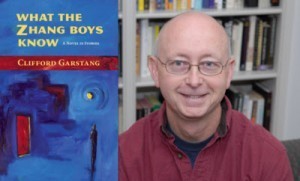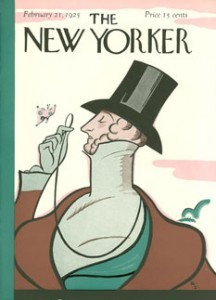Clifford Garstang's Blog, page 90
December 17, 2012
The New Yorker: “Shirley Temple Three” by Thomas Pierce
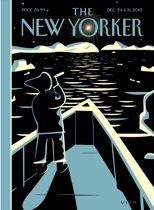 December 24 & 31, 2012: “Shirley Temple Three” by Thomas Pierce
December 24 & 31, 2012: “Shirley Temple Three” by Thomas Pierce
I gather that Thomas Pierce is a student in the MFA program at the University of Virginia, not far from where I live. Which is neither here nor there, except that it’s quite an accomplishment to have a story in the New Yorker while still a student.
And quite a story it is, too. (It’s not behind the paywall, so you can read it for free, and while you’re there check out the Q&A with Thomas Pierce for a little background on the story.)
Here are the basics: Tommy works in Atlanta on a TV program called “Back from Extinction” on which extinct animals are brought back to life through cloning. Which is how he happens to be in a possession of a dwarf mammoth that he brings home for safekeeping at his mother’s (Mawmaw) place. He promptly disappears and Mawmaw is left to figure out how to care for the animal, which Tommy had named Shirley Temple. When Shirley gets sick, Mawmaw calls the vet, then the pastor, but nothing seems to work.
The situation is interesting and I love the characters, but because I found the ending to be unsatisfying I was really hoping the story was an excerpt from a novel. But apparently not. Tommy is a handsome, unreliable man–apparently he takes after his father, who was married to another woman and so could not marry Mawmaw–who doesn’t seem too bright. Mawmaw, though, is a survivor, and seems to genuinely care for poor old Shirley.
Read the story. What did you think of the ending?
December 15, 2012
Tips for Writers: New Year Resolutions
 I haven’t had the most productive writing year, for a variety of reasons (i.e., excuses). I’m determined to do better in 2013. It’s time, then, for some . . . resolutions.
I haven’t had the most productive writing year, for a variety of reasons (i.e., excuses). I’m determined to do better in 2013. It’s time, then, for some . . . resolutions.
My resolutions tend to be of the standard, non-writing variety: Lose Weight (I started my diet in October, so I got a jump start on that one); Exercise More (ditto); Drink Less (what, are you kidding me?). One I plan to work on between now and the end of the year is cleaning my office (not to mention the rest of the house) so I can start the new year with an uncluttered work space.
So my life is in pretty good shape . . . except when it comes to the writing. And here, thankfully, a friend just passed along some guidance from the Creative Nonfiction blog that I intend to take to heart: Keep Your Writing Resolutions This Year! Now, you should take the time to read the original, which goes into some detail, but here’s the basic list of tips for making effective resolutions:
Get Specific (also realistic)
Make Time (no excuses; for me, it helps to stick to a specific schedule every day, but that may not work for everyone)
Get a Partner (the buddy system works)
Move Past Doubt (“give yourself permission to do some bad writing” — Frank Conroy)
Write it Down (But not just the main resolutions–see number 1–but make lists along the way with some specific milestones; I love lists, or, more accurately, I love crossing things off my list, so this is a good one for me.)
Be Still (This is a biggie for me–basically it means find a way to disconnect from the internet, your phone, etc. It’s hard, but . . . find a way.)
That’s the short version. Be sure to read Anjali Sachdeva’s original for more detail.
December 14, 2012
2012 The Year in Reading: Books that didn’t suck
 That’s not a fair title. Much of what I read this year was terrific. But I’m resisting the urge to title this post “The Best Books of 2012” because I didn’t read all the books that were published this year (obviously), and, in fact, many of the books I did read were published earlier. There are so many wonderful books published each year that the New York Times never even hears about, much less reads or reviews, that their lists—and all the other “best of” lists—are kind of meaningless.
That’s not a fair title. Much of what I read this year was terrific. But I’m resisting the urge to title this post “The Best Books of 2012” because I didn’t read all the books that were published this year (obviously), and, in fact, many of the books I did read were published earlier. There are so many wonderful books published each year that the New York Times never even hears about, much less reads or reviews, that their lists—and all the other “best of” lists—are kind of meaningless.
Still, I’ve read a lot of books this year. I can’t say that I’ve been blown away by any of them, however. Some were very good, sure, but nothing came close to, say, Colum McCann’s Let the Great World Spin, still the Book of the Century in my opinion. Let me tell you a little about some of the most memorable books I read in 2012:
The first book I read this year was one of the most entertaining. Ellen Meister’s The Other Life is the story of a woman who discovers a portal to a life she might have had and is faced with some interesting choices. Ellen is a friend and I’m always pleased to read the excellent work of people I know.
Also in January I read The Poet by Yi Mun-yol. We don’t get to see a lot of Korean fiction in this country, so I was happy to see this book, which I sought out because there was a story by Yi in the New Yorker. Anyone with an interest in Korea would find this book rewarding.
I’ve read a number of things by the Dalai Lama, but his recent book Beyond Religion, which is written in a conversational tone, was, I thought, excellent. Highly readable and accessible to everyone, not just students of Buddhism, it offers much to think about.
I had not met Dolen Perkins-Valdez until she came to town to give a talk at the local college, but I found her very personable and engaging. We had a very nice conversation and I picked up her novel Wench, which I thought was a wonderful story about a very difficult subject—slave mistresses in the period before the Civil War.
I also really liked Goliath by Susan Woodring, another friend. This is the story of a small furniture town in North Carolina. Although a body is found right at the beginning of the book, this is no ordinary mystery, and the plot takes one surprising turn after another. But it’s at heart a character study of a most intriguing woman.
This one is on just about everyone’s list for 2012—Cheryl Strayed’s Wild, which was already doing great things when Oprah picked it for her new book club and shot it to the moon. Cheryl, another friend, deserves this great recognition, though, because it’s a terrific book. It’s a memoir and, as with a lot of memoirs, the reader may have the urge to shake the author and ask, “What were you thinking?” But I found the story of her hike on the Pacific Crest Trail to be compelling and wonderful.
I read Jim Minnick’s The Blueberry Years because my local writers’ group was hosting him for a reading. A memoir about the blueberry farm that he created with his wife in Southwest Virginia, the book is a fun read, full of wit and charm—and recipes for blueberries. Jim was a terrific speaker, and came bearing blueberries!
I got into the habit this year of listening to books on tape, not just on long drives but even when I’m just out on errands. Of all the books I listened to—I usually select books I might not otherwise read—the ones that made the best impression on me were John LeCarre’s Russia House and Dennis Lehane’s Mystic River. Neither is new, obviously, but I really enjoyed them both.
Ann Patchett’s State of Wonder held me captive. It’s just one of those books. I can’t say I loved the ending, so it’s not a perfect book, but it’s very entertaining. For writers, the plot is worth studying. Simple, but elegant.
I read wonderful books by two of my writing heroes this year: Tim O’Brien’s memoir If I Die in a Combat Zone and Colum McCann’s Everything in this Country Must. O’Brien’s book I read because I was giving a talk on turning life into fiction and the memoir makes an excellent counterpoint to his collection of stories, The Things They Carried, which of course is one of the best books ever. McCann’s book is a story collection and I read it after meeting him at a symposium. Wonderful work.
And finally, quite possibly the best book I read this year is Roy Kesey’s Pacazo. Roy is another friend, but that has nothing to do with this judgment. The novel, set in Peru, is beautiful and touching and, honestly, a challenging read. It’s about an American who is compelled to find his wife’s killer, but it’s about way more than that. I highly recommend this one.
Here’s to some great reading in 2013.
December 11, 2012
The Next Big Thing
I had the pleasure of meeting Tara Laskowski last year at Press 53’s annual Wine & Words Fest when she was honored for winning second place in the flash fiction category in the publisher’s Open Awards (and as a finalist in another category). (I was there in my capacity as editor of Prime Number Magazine, published by Press 53.) And now Tara has invited me to participate in The Next Big Thing series, a chain of self-interviews where authors talk about their new/forthcoming collections and projects. So, thanks to Tara for this opportunity.
This series is pretty interesting. If you click on Tara’s name above, you’ll see not only her answers to this list of ten questions, but you’ll see links to the writer who tagged her as well as links to the blogs of all the writers whom Tara has tagged. Down at the bottom of this page I’ll link to the blogs of the writers I’ve tagged. And so on. You can learn a whole lot about a lot of writers by following these links.
What is your working title of your book (or story)?
My novel in stories, What the Zhang Boys Know, was published by Press 53 in October 2012.
Where did the idea come from for the book?
Several different places at once, honestly. The idea for the structure came because I was in story-writing mode, having recently finished my first book, In an Uncharted Country (Press 53, 2009) but really wanted to write a novel. The subject matter arose from a recent trip to China during which I visited Nanjing and the site of the 1937-38 Nanking Massacre, also known as the Rape of Nanking (which plays a symbolic role in the book). That suggested to me my setting in Washington (near Chinatown), where I used to live, and also brought to mind the main character, Zhang Fengqi, an immigrant from Shanghai.
What genre does your book fall under?
It’s literary fiction, whatever that means. And it’s a novel. Or short stories. Or both. It’s blue, I know that much.
Which actors would you choose to play your characters in a movie rendition?
Although I haven’t given the casting any thought at all until now, I do think this book would make a pretty good movie. And because we don’t see a lot of roles for Asian American actors in this country, I don’t think we’re very familiar with their names. But how about Jet Li to play Zhang Fengqi and Lucy Liu to play his love interest, Jessica Lee. Nathan the novelist could be someone like Kevin Spacey. And another important character is the neighbor Claudia, and I’m thinking Gwynyth Paltrow.
What is the one-sentence synopsis of your book?
Chinese immigrant Zhang Fengqi, a recent widower and resident of a condo building in a not-quite-gentrified neighborhood of Washington, DC, is searching for a replacement wife and a new mother for his young sons, Simon and Wesley, who weave in and out of the lives of their neighbors conducting their own search for meaning.
Was your book be self-published or represented by an agency?
Neither. I made the sale directly to Press 53, a small press that also published my first book. (I am looking for representation for a recently completed novel, though. Just sayin’.)
How long did it take you to write the first draft of your manuscript?
Only about a year, but mostly in one amazingly productive month at VCCA.
What other books would you compare this story to within your genre?
Olive Kitteridge by Elizabeth Strout comes to mind, because it’s a well-known novel in stories. But there’s also David Schickler’s Kissing in Manhattan, a collection of linked stories set in an apartment building in New York. The book has also been compared to the classic story cycle, Winesburg, Ohio by Sherwood Anderson, but I personally think that’s a stretch.
Who or what inspired you to write this book?
In a way it was the concept of a novel in stories that inspired me. I love reading and writing stories but I know that most readers love to read novels although they generally like reading short stories when they do so (mostly by accident). And it was a structure that, once I’d identified the residents of the building, very nearly wrote itself. (To read more about how I identified those other characters, you might be interested in this brief essay I did: Behind Closed Doors.)
What else about your book might pique the reader’s interest?
Although the book is made up of a very diverse cast of characters and a variety of voices, it’s really something of a multi-generational family saga. But it’s also a book about creativity and art, as several of the characters are writers or visual artists who use their work to speak for themselves, something that I think artists and writers in particular will understand and relate to.
Once again, I’d like to thank Tara Laskowski for inviting me to participate in this series.
I’ve managed to convince these talented writers to play along, and they’ll be posting their answers next week:
Nonnie Augustine will post on December 19 about One Day Tells its Tale to Another on her blog http://augustinesconfessions.blogspot.com.
Tawnysha Greene will post on December 18 at http://tawnyshagreene.blogspot.com/, where she will talk about her novel, A House Made of Stars, which is about to start making the rounds at publishers.
Phyllis Anne Duncan will post on December 18 at http://unexpectedpaths.com. She will talk about her novel A War of Deception.
Marjorie Hudson will post on December 19 at http://marjoriehudson.com/ and will talk about her story collection Accidental Birds of the Carolinas.
Kelly Cozy will post on December 17 at http://kellycozy.blogspot.com/ and will be discussing her forthcoming novel Ashes.
December 10, 2012
The New Yorker: “Creatures” by Marisa Silver
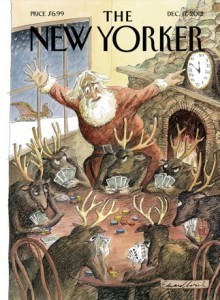 December 17, 2012: “Creatures” by Marisa Silver
December 17, 2012: “Creatures” by Marisa Silver
Because the author has a new novel coming out, I kind of hoped to learn that this story is an excerpt from it. It doesn’t really feel complete to me, and dwells too much in the past. But, apparently, based on the Q&A with Marisa Silver, it’s not an excerpt. So we have to live with what we’ve got.
Since the story is behind the paywall, let me spell it out for you. A husband and wife have a three-year-old son in pre-school. They’ve recently moved from the city where the wife had a hectic and intense medical practice and now they live in a small town—not far from where the husband grew up—and she’s taken over a small town, quiet medical practice. Which they can afford to do because the husband has made a bundle designing and making furniture for a fast-growing chain of coffee shops. But the kid is in trouble at school for pretending to shoot another kid with a stick (his AK47, he calls it) because he’s the police and the other kid is a wobber. (Ugh.) This is problematic for the family because there’s something in the husband’s past, which the wife knows about, that is going to be doled out to the reader in manipulative bit after manipulative bit. Of course we guess what it is, because of the mention of the husband’s childhood friend and guns and funerals. But we’re wrong.
The kid gets suspended for biting the other kid (Hey, they told him not to shoot the boy!) and husband and wife struggle with what it all means and what to do about it.
There is a meditation, of sorts, on violence and boys and guns and hunting, but if there’s a conclusion it’s lost on me. Something like: Boys are violent and they are doomed to brood over it their whole lives.
I did like in the Q&A the comments Silver makes about not starting a story with a theme in mind, only connected threads, and she is content to see what develops. That, I think, is usually the way to build imaginative stories. But this one, in my opinion, is spoiled by the manipulative, drawn out flashback to the husband’s childhood incident.
December 8, 2012
Nominations Open for New Yorker Story of the Year
New Yorker Story of the Year
It’s time to select the New Yorker Story of the Year, as we do every year here on Perpetual Folly. Nominations are open! (If you need a refresher, we have discussed every story right here: New Yorker Stories of 2012.)
What are your favorites? Maybe you liked “A Brief Encounter with the Enemy” by Said Sayrafiezadeh from January. Or maybe “Citizen Conn” by Michael Chabon from February? Or “P.E.” by Victor Lodato? Or “The Proxy Marriage” by Maile Meloy? Or “Means of Suppressing Demonstrations” by Shani Boianjiu? Or maybe you liked stories by Antonya Nelson, Alice Munro, Junot Diaz, T.C. Boyle, Alice McDermott, Etgar Keret, Steven Millhauser, or someone else?
Let me know–either shoot me an email or leave a comment here.
The New Yorker: “A Voice in the Night” by Steven Millhauser
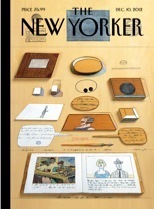 December 10, 2012: “A Voice in the Night” by Steven Millhauser
December 10, 2012: “A Voice in the Night” by Steven Millhauser
I encourage you to read this story, which is available for free online. But that’s only because I’m not sure what to make of it, or how I feel about it. It seems quite a departure for The New Yorker and for Millhauser, and there’s no Q&A with the author (that I’ve found) to help with explication.
The story begins with the Biblical story of the boy Samuel, working for Eli, the high priest of the temple of Shiloh. In the night, Samuel thinks he hears his name called, but it’s not Eli. It happens again and again and eventually Eli tells him that someone else—God—is calling his name. (How much of this is actually in the Bible I’ll leave to others; it’s been a long time since I’ve read that book.)
Now the story jumps ahead a couple of millennia to Stratford, Connecticut in 1950 and another boy, age 7, lying in bed at night waiting to hear his name called. Although his family is non-religious, the boy goes to Sunday school at the Jewish Community Center and he’s heard the story of the boy Samuel who hears his name called in the night.
Jump ahead again and the Author appears. He’s 68 (it happens to be 60 years after the boy in Stratford lay in bed listening for the voice in the night so we can suppose the boy is the Author) and he can’t sleep. He listens to the sounds of the nights, ponders reading something, then thinks of “the boy in the house in Stratford” and acknowledges that he thinks about that boy a lot these days. (The references are all to the boy in the third person, or sometimes second person, suggesting the Author’s distance from the boy, whether or not he is that boy.) He recalls that the boy was isolated in Catholic Stratford.
The story shifts back to Samuel, then the boy, then the Author as each prong of the story proceeds. (There’s a great section where the Author recalls that in the old days he’d recite “fistfuls of sonnets” to help him sleep, and then we get lines from a couple of familiar Elizabethan sonnets.) The Author relates the boy’s experience of family, with visiting grandmothers, living in Stratford, growing up Jewish in a Catholic neighborhood. He keeps asking himself, What is a Jew? (Or is that the boy asking?) And he recalls the lessons the boy learned from his family, including fighting against bigotry. And that his parents are both teachers—they have a “calling” (like Samuel being called in the night) and the boy, the Author, has a calling to write.
Thoughts?
December 7, 2012
Tips for Writers: In Progress (What the heck does that mean?)
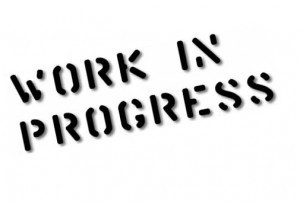 It’s been some time since I posted a new Tip for Writers. Sorry about that. I guess I’ve been busy. Today’s tip is prompted by a question I received from a reader of my Perpetual Folly Pushcart Prize Literary Magazine Rankings. If you’re not familiar with the rankings, be sure to check them out.
It’s been some time since I posted a new Tip for Writers. Sorry about that. I guess I’ve been busy. Today’s tip is prompted by a question I received from a reader of my Perpetual Folly Pushcart Prize Literary Magazine Rankings. If you’re not familiar with the rankings, be sure to check them out.
Here’s the question: What the heck does “in progress” mean as the reported status of a submission in the Submittable online submission manager system.
Answer: Not Much. Now, it may mean something at some magazines, and obviously I can’t speak for all of them, but at Prime Number Magazine it only means that some action has been taken with regard to the submission, but that action could be as insignificant as one editor assigning the submission to another editor. It does NOT mean that the submission has been read, necessarily, and it does NOT mean that it has passed any sort of initial screening. Furthermore, a submission that is still labeled “New” or “Received” may actually have been read already by the first editor assigned. So, in fact, such a submission might be further along in the process than one that is labeled “In Progress.”
As I say, I can only speak for my magazine, but here’s how it works. We have four editors (Fiction, Nonfiction, Poetry, Reviews/Interviews) and submissions are assigned automatically depending on which category a submitter has selected. Such a submission is labeled “Received” (or “New” from the Editors’ side). When the Editors open a submission, the status does not change. In fact, if I don’t reject a story immediately, it may keep that initial status for a long time while I mull it over and look at other submissions available to me. Now, I have several options at this point. I may have an initial impression–favorable, neutral, unfavorable–but not enough to make an accept/reject decision. So I might mark that impression in an internal voting process visible only to the editors. If I do that, the submission’s status will change to “In Progress.” Or, I may discover that a piece was submitted in the wrong category, in which case I can change the category–shifting it from fiction to flash, for fiction to non-fiction. The status of that submission will change to “In Progress” whether or not I’ve read the piece. Or, I may want to get the opinion of another editor on something and so I will add that editor to the submission’s review assignment and, again, the status changes to “In Progress” even though I may not have actually read it fully.
So, bottom line, the “In Progress” status in Submittable, at least the way it is used at Prime Number Magazine, means that something has happened with a submission, but not necessarily much. And the absence of “In Progress” in the status line doesn’t mean that nothing has happened. In other words, you can’t read too much into “In Progress.”
December 5, 2012
[My] Books Make Great Gifts!
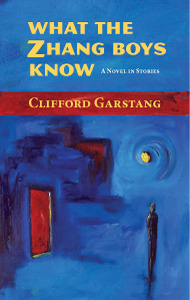
Books make great gifts. Right? I mean, they’re compact and easy to wrap. They don’t cost much to mail. They’re durable, require no batteries, and provide countless hours of entertainment that can be shared with others. Then there are the eBook varieties that can be delivered instantly—to your own eReader or someone else’s.
And I just happen to have two books available that I think would be terrific under the tree (or wherever you celebrate your end-of-year holiday gift giving.
My most recent book, What the Zhang Boys Know, has been getting terrific reviews. It’s a novel in stories set in a condominium building in Washington, DC. Not only does it tell the story of the Zhang family, a widower and his two young sons, but it also delves into the lives of the other residents of the building. John Casey calls it “a wonderful and haunting book.” Christine Schutt says the stories are “deeply satisfying and life-affirming.” Kevin Wilson says, “In prose that is measured and confident, Garstang carefully works to show us how these characters’ grief and loneliness becomes utterly beautiful and unforgettable.” To read more about the book and to order your copy, go here.
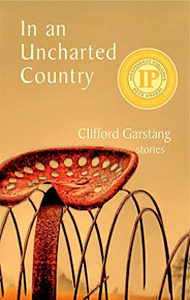 And then there’s my previous book, In an Uncharted Country. That one is a collection of linked short stories set in a small town in the Shenandoah Valley. Tim O’Brien calls it “impeccably written, sumptuously imagined, and completely enchanting.” Elizabeth Strout says of the book’s characters, “they are real, vulnerable, and always, in unique ways, brave.” Peter Ho Davies says, “In an Uncharted Country is a subtly braided collection of spare, taut stories that conjures a community and a way of life with respect, affection, and intimacy.” To read more about the book and to order your copy, go here.
And then there’s my previous book, In an Uncharted Country. That one is a collection of linked short stories set in a small town in the Shenandoah Valley. Tim O’Brien calls it “impeccably written, sumptuously imagined, and completely enchanting.” Elizabeth Strout says of the book’s characters, “they are real, vulnerable, and always, in unique ways, brave.” Peter Ho Davies says, “In an Uncharted Country is a subtly braided collection of spare, taut stories that conjures a community and a way of life with respect, affection, and intimacy.” To read more about the book and to order your copy, go here.
December 3, 2012
The Duotrope Announcement
 So, Duotrope.com is going to start charging. Good for them. It’s a terrific resource that has, up to now, relied on donations from users to cover their costs. The problem is, a very small percentage of users actually donated. The rest—the freeriders—used the information and never paid a cent, letting the rest of us pick up the tab. Here’s the full announcement.
So, Duotrope.com is going to start charging. Good for them. It’s a terrific resource that has, up to now, relied on donations from users to cover their costs. The problem is, a very small percentage of users actually donated. The rest—the freeriders—used the information and never paid a cent, letting the rest of us pick up the tab. Here’s the full announcement.
What is Duotrope? It’s a wonderful resource—a searchable database of nearly every literary magazine and small press. These are the markets that writers, especially writers at the early stage of their careers, need to know about in order to get their work published. The database can be searched by a host of parameters—payment levels, submission periods, genres, etc. It includes links to magazine websites and a summary of submission guidelines. In addition, Duotrope includes a submission tracking system. It’s easy enough to track your own submissions in a spreadsheet, of course, but the beauty of a shared system is that it provides an idea of what response times from a given magazine should be. It’s not hard to see how that can be useful if you’re watching your submissions closely.
Since the announcement was made of this new business model, I’ve seen comments by writers that are enthusiastic in their support of Duotrope and have jumped to subscribe. I’ve seen others who are outraged. I don’t get the outrage.
Duotrope is a resource. It’s not something anyone is entitled to. Shame on the people who used the resource but didn’t pay for it. When I was in my MFA program, we were encouraged to use Writers’ Market in order to get information about markets for our stories and poems. I forked over the money for a new copy of Writers’ Market each year, as it was updated every twelve months. And I was happy to have the information in a handy form. For me, Duotrope has replaced Writers’ Market, and I’m perfectly willing to pay for the information if I need it for submitting now.
Granted, some people can’t afford the $5 for a one-month subscription. (Really? Okay, maybe, but let’s be honest about where our priorities are.) If it’s true, as some argue, that the same information is available elsewhere for free, then those people can get that information elsewhere. I’ve never seen a resource that functions as well as Duotrope, though, or is as complete. Poets & Writers has a very nice online listing of magazines, it’s true. About 850 markets are listed. Dutotrope has something like 4500 markets, with a search engine that is more robust than P&W’s.
I’ll continue to use Duotrope until I find something better, and I’ll willingly pay to keep it in existence.

